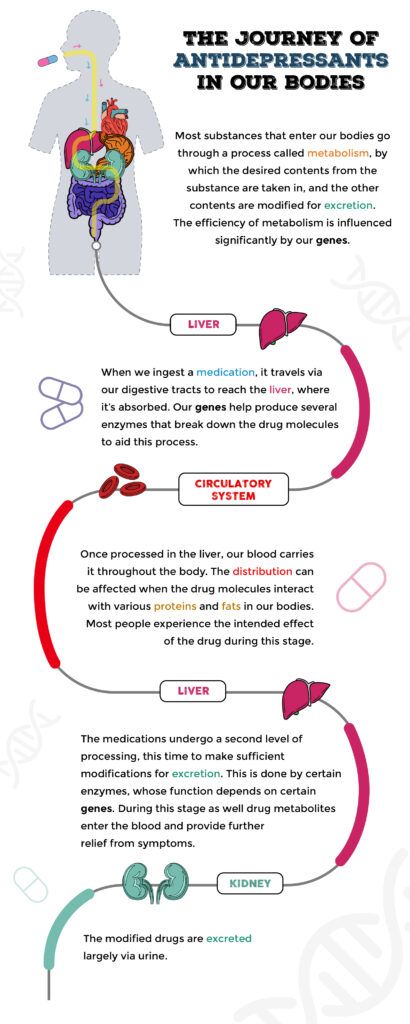Depression, Genes, And Genetic Testing
Depression is one of the most common mental health disorders worldwide.
Thankfully, it is now possible to handle major depressive disorder and its related symptoms with medications and therapy.
The medications prescribed for treating depression are called antidepressants.
There are different classes of antidepressants available, depending on the drug composition and what they do to the body.
While some people get better from the first day of using antidepressants, others are not so lucky.
They may have to keep trying combinations of medicines before identifying ones that work well.
It may take several months, even years, at times, to narrow down on drugs that work for the person.
Why do antidepressants that work for some have no effect on others?
Genetic makeup could be an important reason why.
According to experts, a person’s genes can influence their response to treatment.
Specific genes may change how a drug is metabolized in the body and, as a result, increase or decrease its effectiveness.
In other words, your genes influence the type and exact dosage of antidepressants you may need to feel better.
Your genes may also influence the risk of side effects from these drugs.
Genetic testing studies your genes and their functions to know how they work and identifies changes/mutations in your DNA, if any.
Pharmacogenomics is the process of testing your genes to understand the body’s response to drugs.
Pharmacogenomics is one of the growing branches of science that is of extreme interest globally.
Also Read: How Genes Affect Your Response To Drugs
Types Of Antidepressants
Some of the popular antidepressants include:
Selective Serotonin Reuptake Inhibitors (SSRIs)
SSRIs are popular as they are better tolerated and have milder side effects. SSRIs also have relatively lesser adverse interactions with other drugs and work by increasing serotonin activity in the brain. Serotonin is a neurotransmitter that is associated with mood regulation and better sleep.
Serotonin-Noradrenaline Reuptake Inhibitors (SNRIs)
The functioning of this drug is very similar to SSRI, except that this drug acts upon two neurotransmitters - serotonin and noradrenaline. Noradrenaline triggers the fight-flight response in the body.
Noradrenaline And Specific Serotonergic Antidepressants (NASSAs)
NASSAs are prescribed if a person doesn’t react well to SSRIs and SNRIs. NASSAs may not cause sexual problems, a common side effect of the above two medications.
Tricyclic Antidepressants (TCAs)
TCAs were one of the first antidepressants introduced. These are not very commonly prescribed now because their overdose can turn fatal. In rare cases, people who don’t react to other antidepressants may be prescribed TCAs.
Serotonin Antagonists and Reuptake Inhibitors (SARIs)
SARIs are also rarely used as primary treatments for depression. They are only prescribed in case other medications don’t work or in case of severe depressive disorder needing a combination of medicines. This drug is effective in treating insomnia and anxiety that are associated with depression.
Monoamine Oxidase Inhibitors (MAOIs)
MAOIs primarily work by preventing the monoamine oxidase enzymes from breaking down neurotransmitters like serotonin and dopamine. By doing this, the levels of these neurotransmitters increase in the brain, leading to a better mood.
MAOIs may lead to severe side effects and are only prescribed if none of the other antidepressants work.
Image: How Do Antidepressants Work
Side Effects Of Antidepressants
All antidepressants come with side effects. The effect can be mild or severe, depending upon the dosage, the period of use, and the individual’s response to the drug. Some of the side effects common to all these types of antidepressants are:
- Dry mouth
- Dizziness
- nausea
- Weight gain
- Sexual problems
- Irregular heartbeat
- Insomnia
- Anxiety
- Excessive sweating
Genetic Testing For Antidepressants
Without knowing for sure how the person’s body reacts to different antidepressants, the patient may have to waste time trying different combinations of medicines and dealing with their side effects.
Genetic testing may offer insight into what medications could work and reduce the trial-and-error period.
What Studies Tell
Genetic changes (mutations) cause genes to work differently in every individual, and these changes could do one or more of the following.
- Increase or decrease the rate of metabolism of the drug (causing changes in the duration and intensity of the drug working in the body)
- Increase or decrease the risk of developing side effects from the drug
- Makes the person non-responsive to the drug
Some of the popular genes that could cause these changes are CYP2D6, CYP2C19, SLC6A4, HTR2A, and ABCB1.
While genetic testing can bring about better clarity in using the right drugs, please remember that the field is still growing.
This means that pharmacogenomic testing may not be available for all antidepressants.
Also, apart from genes, other factors could influence your response to a drug, including your age, lifestyle, medications, and health conditions.
According to studies, it may be beneficial to opt for genetic testing when a person has shown low tolerance or has been non-responsive to at least one pharmacological treatment.
Your doctor would be able to help you decide on this.
Summary: Genetic Testing For Antidepressants
- A person’s genes may affect the way their body reacts to antidepressants. Pharmacogenomics is a field of study where genes are tested to understand the body’s response to drugs.
- There are different types of antidepressants depending on their compositions and the way they react in the body.
- Genetic testing may offer insight into what antidepressants could work for an individual and reduce the trial-and-error period.
- Some genes that could determine how the body reacts to antidepressants are CYP2D6, CYP2C19, SLC6A4, HTR2A, and ABCB1.
- Pharmacogenomics is a growing field of study and, over time, may help customize drugs and their dosages, so they work as intended for every person.
References
- https://www.health.harvard.edu/blog/gene-testing-to-guide-antidepressant-treatment-has-its-time-arrived-2019100917964
- https://newsnetwork.mayoclinic.org/discussion/mayo-clinic-q-and-a-genetic-testing-and-antidepressants/
- https://www.psycom.net/pharmacogenomics-definition
- https://www.pharmgkb.org/chemical/PA452229/variantAnnotation





